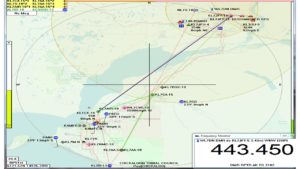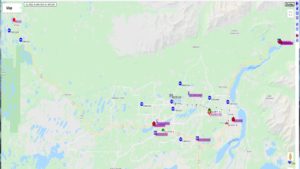Packet radio is a very old protocol that we use a lot here in Alaska. It allows you to connect your VHF radio via a TNC to your computer to allow it to connect to a node, operate like a chat room. We have 2 packet nodes in South Central. Eagle, located at the same location as the 147.30 repeater above Ft Richardson. Its frequency is 145.010 Mhz. It's call sign is KL7ION-2 but you can use the Alias for Eagle to connect to it. Note: it is the first link to enter the Eagle Network from the Matsu Valley area to the Kenai and down to Homer, with mailboxes along the way. The other node is located above Sears in the Valley off Seward Meridian
Parkway. It's call sign is KL7JFU-2 or an Alias of Valley on 147.960 MHz. These are simplex nodes and do not have mail boxes attached. There are digis at EARS on JBERs to connect to these if you can't direct. KL7AIR-2 is the digi's call sign.
You can use either regular modems or sound-card modems to connect to these nodes, it will depend on the software you use how as to how it will work. The software is available for Windows, XP, 7 or 10 also Linux and Mac. The basic commands used with packet are:
C Valley (Connect to Valley node or Connect to Eagle node)
Talk (To begin conversation on the node) TNC Dependent
Conv (to begin conversation on the node) TNC Dependent
MH (What stations did the node hear)
Link (Link status if you are diging to the node) LINK KL7AIR-2)
/ex (To back out of talk mode)
b (to disconnect from node)
disconnect (to disconnect from node or link) TNC Dependent
MYCALL (to enter your call sign into your TNC the first time or see what call is in the TNC) MYCALL KL7JFT
I use Airmail packet for older TNCs or Simple Terminal, part of Winlink I use Putty for internal TNCs I use Sound Modem for Sound Card TNCs and then Winlink for radio email. As mentioned earlier, there are several different type of modems, software and commands to use.
Below are various software and packet information sites.
Packet Connections and Basic Commands
So you want to learn and operate Packet Radio?
Putty Telnet Software Down Load

Alaska hosts several WINLINK systems. Winlink 2000 (WL2K) is a worldwide system of volunteer resources supporting e-mail by radio, with non-commercial links to internet e-mail. These resources come from Amateur Radio, the Military Auxilary Radio Systems (MARS), and other volunteer organizations. The system provides valuable service to emergency communicators, and to licensed radio operators without access to the internet. The software is available at the Winlink site
| WINLINK | Callsign | Frequency |
| Anchorage VHF RMS | WL7CVG-10 | 144.9 |
| Anchorage VHF RMS | KL7AA-10 | 144.98 |
| Palmer VHF RMS | KL7JFT-10 | 145.19 |
| Fairbanks VHF RMS | KL7EDK-10 | 147.96 |
| Valdez VHF RMS | AL4O-10 | 145.1 |
| Central VHF RMS | KL2GS-10 | 147.96 |
In addition to these VHF RMS systems we have an HF RMS in Anchorage as well.
This system scans predefined frequencies over 4 bands for incoming connections.
Information can be found on the web at WINLINK.ORG.
| Call Sign | Grid Locator | Frequency Scanned | Mode |
| WL7CVG | BP51CE | 7,075.900 KHz | Pactor I,II |
| WL7CVG | BP51CE | 3,589.000 KHz | Pactor I,II,III |
| WL7CVG | BP51CE | 14,096.200 KHz | Pactor III |
| WL7CVG | BP51CE | 14,065.900 KHz | Pactor I,II |
| WL7CVG | BP51CE | 10,143.700 KHz | Pactor I,II,III |
| KL7EDK | BP64DV | 3.595.000KHz | Pactor I,II,III,WINMOR, VARA |
| KL7EDK | BP64DV | 7.065.900KHz | Pactor I,II
|
| KL7EDK | BP64DV | 7.103.500 KHz | Pactor III,VARA,WINMOR |
| KL7EDK | BP64DV | 10.147.700 KHz | Pactor I,II,III
|
| KL7EDK
KL7EDK |
BP64DV
BP64DV |
14.064.000 KHz
14.110.500 KHz |
Pactor I,II Pactor III,VARA,WINMOR
|

AARC also operates on APRS (Automated Packet Reporting System) and supports
APRS as a local APRS I-GATE in the South Central Alaska Region.
APRS Beacon operates on 144.390 MHz.
Also in the immediate area are I-Gates at KL7AIR-10 on Elmendorf AFB, KL5E-10 in Eagle River, and KL7JFT-5 in Matsu Valley
An I-Gate relays APRS position data to the various websites like APRS.FI or FINDU.COM.
You can also send short ACSII messages over APRS.
Almost every APRS Client system digi-peats position data.
South Central APRS Network

